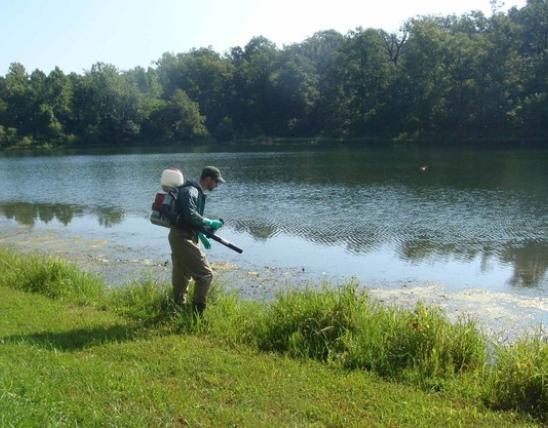Conservation Commissioner Anita Gorman has great advice for grandparents: Use every opportunity to introduce your grandkids to nature.
Her grandmother, Alice Belle McPike, helped her connect with the natural world and she, in turn, is now teaching her own grandchildren about nature's gifts.
She is proud of the handiwork of her 8-year-old granddaughter, Michelle Royle, who created a diorama of swans swimming in a pond. The swans are made of Playdough and they swim among construction-paper reeds and brightly colored fish. Michelle wrote a glossy booklet on swans and their habitat to accompany the diorama.
Mrs. Gorman is the link between Alice Belle McPike and Michelle. Together they represent five generations who have grown to love and appreciate "The Woods."
"All our farms were surrounded by forest, but the special place, the one we called "The Woods," belonged to Aunt Janie," recalled Mrs. Gorman. There, bluebells grew in profusion and a steep, shaded hollow produced succulent morels. The whole family joined in treasure hunts for mushrooms, wildflowers and unusual rocks. "You'd go to our cousins' homes and each one would be filled by our rock collections."
The Fabius River flowed through the farm of one of Anita's aunts. It yielded beautiful geodes-round rock formations filled with crystals-yet another natural quarry for the treasure hunters. Her cousin, Jack Triplett, keeps the farm in pristine condition.
Alice Belle McPike was almost 90 when she accompanied the family to The Woods for the last time in 1954. Mrs. Gorman remembers it as a special time with a woman who had forever influenced her appreciation for the natural world.
"She grew up in Marion County, but went to finishing school in Connecticut," recalled Mrs. Gorman. "She endured the hardships of the Depression but managed to keep a productive garden by irrigating it. We had no idea there was a Depression going on! Our family rarely threw anything away, so conserving in the outdoor world came as second nature to all of us. We also quickly learned from our grandparents respect for Native Americans. If we were lucky enough to find an ancient artifact to add to the family collection, it was cause for celebration."
Mrs. Gorman remembers lively conversations about civic issues and events around the family dinner table.
"All of the family members viewed working hard, being thrifty and caring for the less fortunate as part of everyday life," she said. "Because family was so important to my grandparents, we learned at an early age to respect our forebears. We were surrounded by many of their possessions and stories of their struggles."
Her grandmother had seven children, but one-a son-died as an infant. "I always wondered why she wouldn't tolerate white flowers in her garden, then someone explained to me that white flowers were always used at the funerals of children. For my grandmother, they were a painful reminder of the loss of her baby."
However, her grandmother grew colorful flowers in profusion. "They adorned the church so thoroughly each Sunday that Grandpa sometimes complained he felt like the town undertaker because Allie had him carry in so many flowers to the church."
Going to church was a family affair, as was going to The Woods. "Getting to go to The Woods remains one of my happiest childhood memories, partly because the activity included everybody-from grandparents to the youngest child, and because of the tradition in our family, which started long before my time, of protecting nature. The Woods on my cousin's farm in Marion County remain lovely today. Besides the unusually blue bluebells and the geodes in the stream beds, quartz crystals are still plentiful in the area, and the variety of wildflowers, such as wild hyacinths, hepatica, Solomon's seal, Jack-in-the-pulpit and bird's foot violets, is absolutely delightful."
Going to the woods was as much a part of Mrs. Gorman's life as going to a mall or playing a video game is to today's generation.
"I started from day one with my grandchildren to make sure they had experiences similar to mine," said Mrs. Gorman. "It means so much to us as individuals-and for society-to understand where we all come from. We're all a part of nature and must be taught to value and nurture it.
"Some grandparents teach their grandchildren to hunt and fish, and those are excellent ways to introduce them to nature. But there are other ways that are just as valuable."
Mrs. Gorman, with her grandchildren's assistance, has created a wildflower garden in her backyard. From a treehouse perch, the grandkids can survey their wild realm and get to know its citizens. They help transplant wildflowers, digging in dirt and making the acquaintance of earthworms, slugs and other critters. And they accompany Mrs. Gorman on her forays around the state to visit conservation areas and facilities.
"Anyone can introduce kids to nature, and it's the best gift they can ever give," she says. Grandparents are especially appropriate to fill the role because they usually have more time available than parents and are looking for high quality ways to spend it.
Here are some practical tips for inspiring future conservationists:
- Encourage young children to use all their senses when exploring nature. Let them dig in the dirt, smell the flowers and listen to the birds.
- Use books to reinforce their observations. What is that bright red bird? Show them a picture of a cardinal in a bird book.
- Encourage curiosity. Say, "I wonder what's under this rock?" Then show them the hellgrammite or crawdad that lurks underneath.
- Don't be squeamish. If you find a dead animal in the woods, use it as an opportunity to explain the role of death in life.
"My grandparents gave me a good foundation on which to build my life," concludes Mrs. Gorman. "Small children benefit enormously from being around older generations, and those of us lucky enough to be grandparents realize it is one of the few things in life that can't be overrated. A love of nature is a great heritage which can be passed on free of charge-regardless of tax laws!-and will be a legacy for your grandchild to enjoy forever."
And More...
This Issue's Staff
Managing Editor - Bryan Hendricks
Art Editor - Dickson Stauffer
Artist - Dave Besenger
Artist - Mark Raithel
Photographer - Jim Rathert
Photographer - Cliff White
Staff Writer - Jim Low
Staff Writer - Joan McKee
Composition - Libby Bode Block
Circulation - Bertha Bainer






















